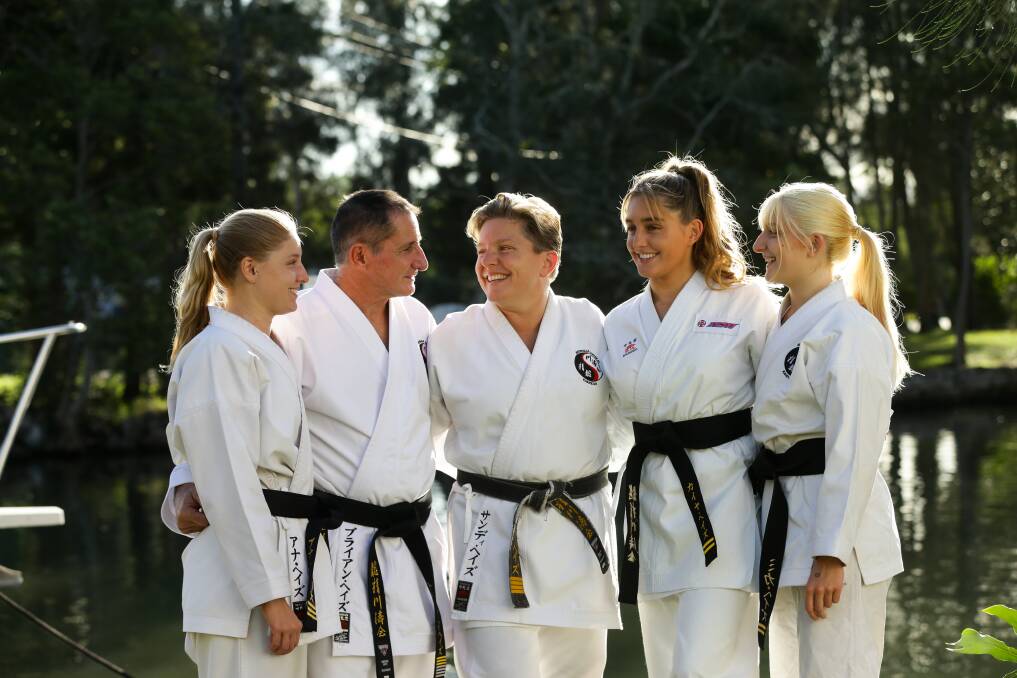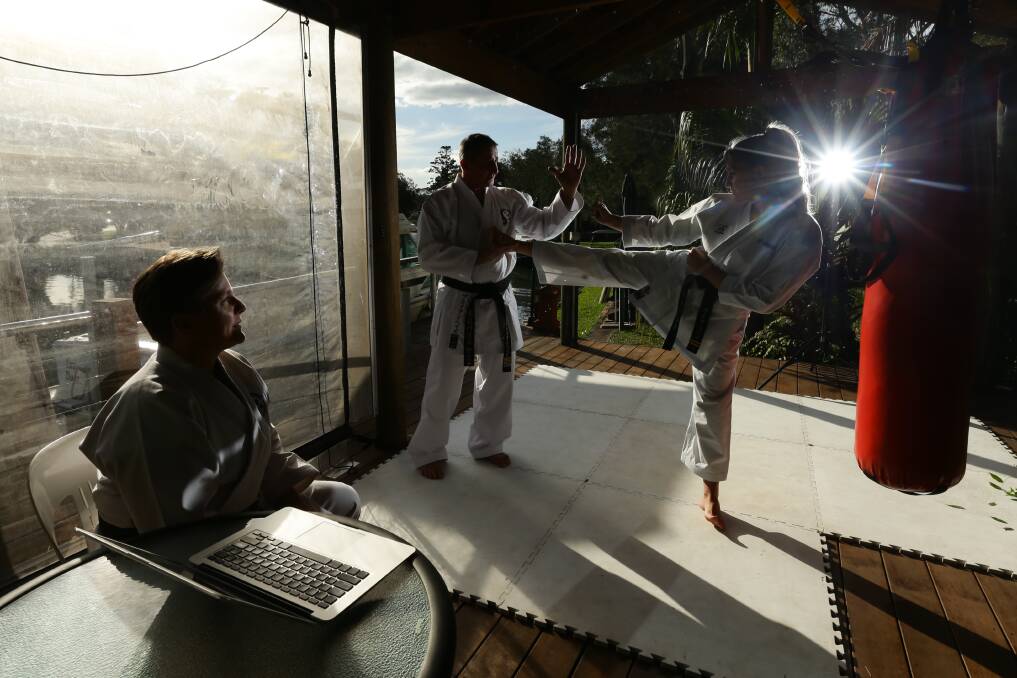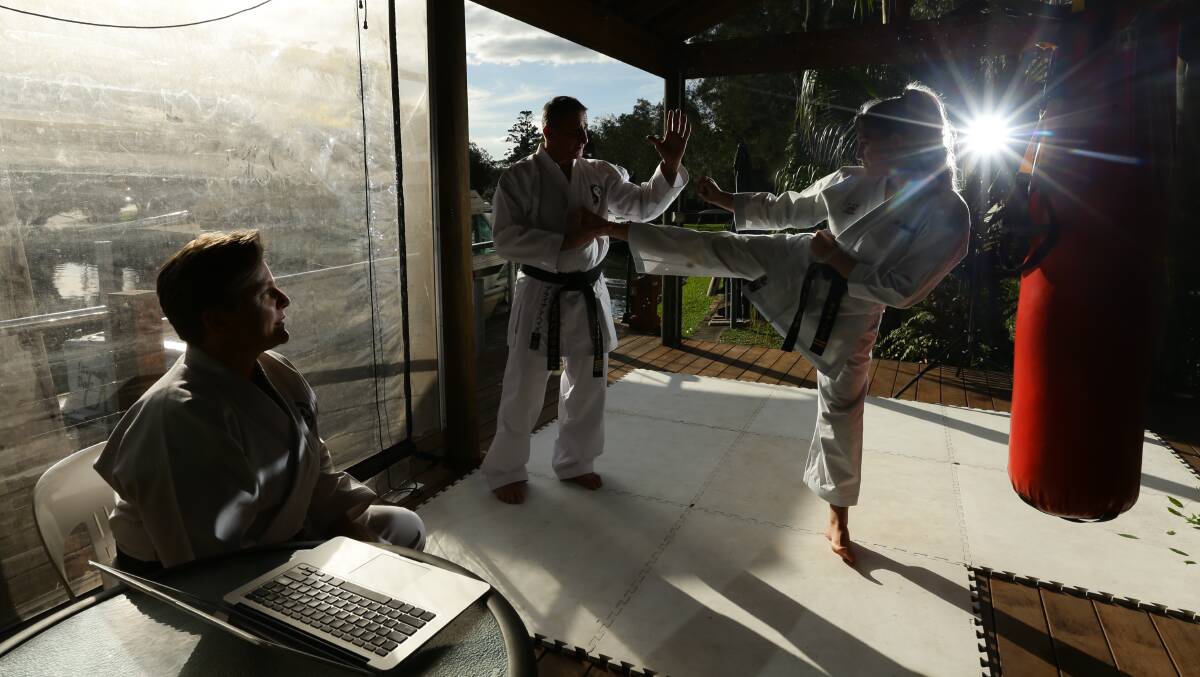
IF you asked Brian Hayes eight weeks ago if he could teach and grade martial arts students online, he would have laughed in your face.
Subscribe now for unlimited access.
$0/
(min cost $0)
or signup to continue reading
"I am a purist in what I do - we do traditional martial arts, and I would have put up all sorts of hurdles because that would have been my habit of thinking," the 62-year-old owner of Hunter Valley Martial Arts Centre says.
When Covid-19 closed the company's five Hunter training centres, Mr Hayes, a Kyoshi [master karate teacher] with a 7th degree black belt and the highest grading in Chitokai karate outside Japan, and his wife Sandy, a fourth degree black belt, had to rethink their operations. Their daughters Anna, Mika and Kaia, are among staff.
"Our business and students are dear to us, if martial arts is about resilience then it's precisely these times that all of this training was meant for - when you are in a time of crisis, suffering anxiety and apprehension, this is precisely the time you need those skills and our service," Mr Hayes said.
"Families in lockdowns need to find resilience strategies and ways to play, learn and live together."

We agreed that what we do now defines us.
- Brian Hayes
The Hayes family and their staff brainstormed and asked each other what the business stood for before finding their answer: character development and resilience.
"We agreed that what we do now defines us. We'll look back and think, 'Did or didn't we we do well in the crisis?' and all our staff have worked above and beyond the service we believe in. I'm gobsmacked how they have been," Mr Hayes said.
Within three days of the meeting, Mr Hayes' eldest child from his first marriage, Ben, founder of Newcastle video production outfit Eluminate, had trained his step-sister, university student Anna, how to shift the business online.
By then, the business had lost every one of its 1500 students, many of them young children with behavioural challenges including Attention Deficit Hyperactivity Disorder whose families turn to the training as part of their child's wellness plan.
"Overnight all of our billing payments stopped and we effectively had zero. So we contacted all of our clients and invited them to switch from group training to online," Mr Hayes said.
"I think like most businesses we'd been thinking of online capacity for years, but never done anything about it. Three days from close down we had a Vimeo showcase training, we had Zoom interactive meetings and we had developed an app."
"We did in three days what we had been talking about for at least three years."
The business now has 650 students that are paying a reduced fee to continue unlimited training, from small sessions to group activities.
It has been forced to let its casual employees go but successfully applied for the JobKeeper subsidy for its permanent and permanent part time workers.
"We have lost 80 per cent of revenue but we think it's a success story because we have kept 650 in our community alive and interested," Mr Hayes says.
Karate has bequeathed Mr Hayes, a former school teacher, a lot in life - from employment to marriage.
As a student and keen sportsman, he happened across some martial arts students when he was at the University of Newcastle campus in 1976. After dabbling in Taekwondo, he tried karate when he was living in Lithgow, one of his first teacher postings.
In 1983 he began teaching students the discipline as a teacher at West Wallsend High and within six years had opened the first full-time karate school at Main Road, Glendale.
Not long after, he met his wife, Sandy, a Canadian who visited Newcastle in her capacity as a translator for 200 Japanese martial arts students who were competing in a world championship in Chito-Ryu karate.
"She help me run the tournament and saw my appalling business that was heading inexorably for bankruptcy because I was a school teacher trying to pay rent on a full-time centre. She said she would stay for a year and if we could turn it around she'd be my business partner," Mr Hayes says.
The couple have grown their business to include five Newcastle locations run by staff. Their three daughters are all instructors.
Mr Hayes says that martial arts is not just kicking and punching, rather it's all about character and resilience.
"Parents don't bring their children to learn to fight, they bring them to learn focus, self-control, self defence, respect and self esteem and anti-bullying so we have targeted that and as a result we've gone from a very competitive centre where we bred world champs out of Newcastle to a centre that really is inclusive and allows everyone the opportunity to find their potential," he says.
Keeping his staff employed, he says, is important because it takes about six years to develop an instructor.
"If you lose them it takes a long time to teach them that wealth of knowledge - they have to learn leadership, character development and pedagogy that you need to teach kids with challenges. A lot of our pupils have learning disabilities, ADHD or are on the spectrum," he explains.
He is both bewildered and excited by the change in the operations of his centres.
"I used to say martial arts had to be physical, but I have had students doing self defence application and they are learning them online, doing them invisibly, learning advanced skills and I am stunned. You have to shift your paradigm - we've had to challenge ourselves as teachers and communicators," he says.
"I had a Zoom group meeting and filled two screens as I didn't realise I had to scroll to see everyone...they were training online with me, it was amazing."
Mr Hayes says more than 350 students have successfully completed their online gradings as scheduled, with his staff delivering their new belt and certificate from a safe distance to their door.
"Seventy per cent of our eligible students passed to the next level in our online pre-testing and grading and I didn't think there was a drop in standard," he says.
He is fearful of a second wave of outbreaks and hopes that his business can continue and stay afloat for as long as it can when the JobKeeper support peters out.
"We hope this has changed forever the way we manage our business and connect with our clients. I think something good will come out of it if we can stay with it," he says.
"If we have to shut down for a long time without government support we are sunk, but we are doing the best we can.
"We dipped into our personal savings to stay afloat before the JobKeeper, my wife and I were willing to take that risk because you realise at times like this we are a community."
The challenge remains to tweak its business model after coronavirus to ensure its financial viability, however Mr Hayes says the new model has aided some students, including those travelling long distances to train.

Together, not Alone is a partnership between Out of the Square, the Newcastle Herald and the Greater Bank. Its aim is to inspire some positivity in these difficult times and will feature a series of stories that explore kindness, innovation, creativity, celebration and mindfulness among businesses and the community.
READ MORE:
- Doing whatever it takes to keep afloat
- Mindfulness expert's advice on how to cope
- Helping out victims of crime
- We're all in this - burger joint's helping hand
- Mollyjane's signs of hope and love
- Together, Not Alone - a new initiative to inspire
- Hope blooms for florist
- Darby Street's creative spirit finding solutions
If you have a story worth telling, contact Penelope Green: penelope.green@newcastleherald.com.au

